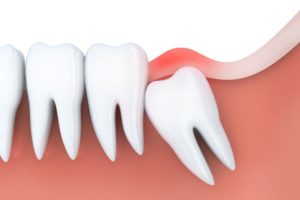
Millions of people still have their wisdom teeth. If you are among them, you may wonder about your third molars from time to time. Should you get them removed, or will it be okay if they stay in your mouth? The answer to that question depends partially on whether the teeth are impacted (stuck beneath the gumline). What problems can be caused by impacted wisdom teeth? Read this blog post to learn about a few.
Pain
Pain and general discomfort are among the most common symptoms of impacted wisdom teeth. Since there is not enough room in the mouth for them to erupt properly, they can push against nearby structures and cause irritation. For example, they might contact the roots of other teeth or cause gum problems. The pain can be dull and subtle, sharp and distracting, or somewhere in the between.
Infections
Even if you are very diligent about oral hygiene, you might find it challenging to keep your wisdom teeth and the area around them clean. Therefore, bacteria can accumulate in those spaces and lead to infections. You might experience swelling, pus, pain, and even systemic illness as a result.
Cavities
The difficulty of cleaning your wisdom teeth may allow plaque to accumulate on them. Over time, plaque can lead to cavities. Small cavities may not cause any symptoms, but as they become deeper and larger, they can cause extreme dental sensitivity, throbbing toothaches, and other awful symptoms.
Misalignment and Difficulty Eating
As the wisdom teeth attempt to erupt from the gumline, they can push the nearby teeth out of place, leading to a misaligned bite. If your top and bottom teeth do not work harmoniously together, you might find it more difficult to eat your favorite foods. Plus, the appearance of your smile may be negatively affected.
Cysts
A cyst is a fluid-filled sac that sometimes forms around an erupting tooth. They are common around wisdom teeth. Often, they are benign. However, in some cases, they can cause serious harm. For example, they might push against nearby teeth, nerves, and bones, leading to both pain and tissue damage.
What Should You Do?
If your wisdom teeth are currently causing problems, you should visit your dentist for a consultation ASAP. If appropriate, they will help you arrange wisdom tooth removal surgery.
On the other hand, if your wisdom teeth are currently symptom-free, you could choose to get them removed as a precautionary measure. Alternatively, you could keep them and monitor them carefully so you can get them extracted as soon as they start to cause problems.
Impacted wisdom teeth can threaten your oral health! Removing them is usually the smartest thing to do.
Meet the Practice
The experienced team at Torrington Dental Care proudly provides a broad range of oral health services to our community. If you are concerned about your wisdom teeth, we would be pleased to assess the situation and guide you on your next steps. Contact our practice at 860-259-4073.
